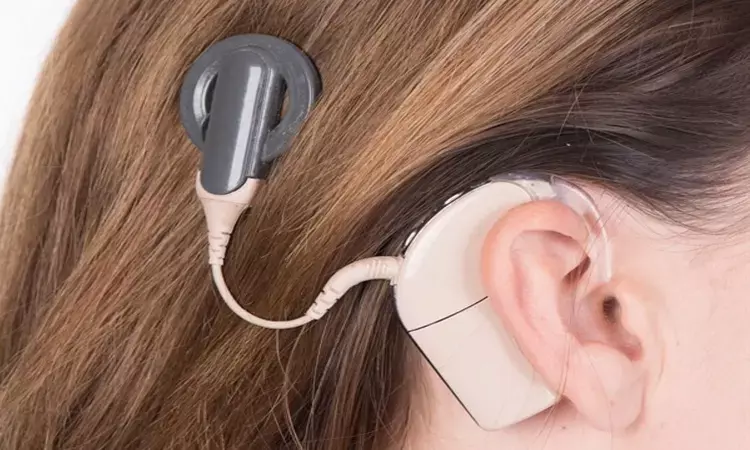- Home
- Medical news & Guidelines
- Anesthesiology
- Cardiology and CTVS
- Critical Care
- Dentistry
- Dermatology
- Diabetes and Endocrinology
- ENT
- Gastroenterology
- Medicine
- Nephrology
- Neurology
- Obstretics-Gynaecology
- Oncology
- Ophthalmology
- Orthopaedics
- Pediatrics-Neonatology
- Psychiatry
- Pulmonology
- Radiology
- Surgery
- Urology
- Laboratory Medicine
- Diet
- Nursing
- Paramedical
- Physiotherapy
- Health news
- Fact Check
- Bone Health Fact Check
- Brain Health Fact Check
- Cancer Related Fact Check
- Child Care Fact Check
- Dental and oral health fact check
- Diabetes and metabolic health fact check
- Diet and Nutrition Fact Check
- Eye and ENT Care Fact Check
- Fitness fact check
- Gut health fact check
- Heart health fact check
- Kidney health fact check
- Medical education fact check
- Men's health fact check
- Respiratory fact check
- Skin and hair care fact check
- Vaccine and Immunization fact check
- Women's health fact check
- AYUSH
- State News
- Andaman and Nicobar Islands
- Andhra Pradesh
- Arunachal Pradesh
- Assam
- Bihar
- Chandigarh
- Chattisgarh
- Dadra and Nagar Haveli
- Daman and Diu
- Delhi
- Goa
- Gujarat
- Haryana
- Himachal Pradesh
- Jammu & Kashmir
- Jharkhand
- Karnataka
- Kerala
- Ladakh
- Lakshadweep
- Madhya Pradesh
- Maharashtra
- Manipur
- Meghalaya
- Mizoram
- Nagaland
- Odisha
- Puducherry
- Punjab
- Rajasthan
- Sikkim
- Tamil Nadu
- Telangana
- Tripura
- Uttar Pradesh
- Uttrakhand
- West Bengal
- Medical Education
- Industry
Should ventilation tubes be removed or retained during pediatric cochlear implantation? Study sheds light

Japan: The insertion of a ventilation tube (VT) is usually recommended before cochlear implantation (CI) in pediatric cochlear implant candidates with recurrent acute otitis media (AOM) or chronic otitis media with effusion (OME). However, there is no consensus on whether VT is beneficial even after the implantation or whether the tube should be removed or retained during cochlear implantation.
Hiroshi Yamazaki, Kobe City Medical Center General Hospital, Kobe City, Japan, and colleagues, therefore, aimed to evaluate the effect of tube placement following CI, particularly on the incidence of post-CI AOM, in children recipient of cochlear implant who had undergone VT insertion before cochlear implantation because of recurrent AOM or chronic OME in a retrospective medical record review.
The study, published in Otology & Neurotology, suggests that retaining the tube in position rather than removing it may decrease the incidence of acute otitis media at least six months after cochlear implantation in CI for children who already have a VT because of a recurrent AOM or chronic OME.
The researchers recruited 58 consecutive ears of children who underwent the insertion of a ventilation tube followed by cochlear implantation at age seven years or younger between 2004 and 2021. Before 2018, the team removed the VT simultaneously with CI (removed groups, 39 ears), and the tube, since then, has remained in place during CI (retained group, 19 ears).
The proportion of ears that developed acute otitis media at post-CI six months in the removed and retained groups was determined (primary outcome).
The authors reported the following findings:
· The age at CI was significantly higher in the removed group than in the retained group (mean: the removed group, 2.9 yr; the retained group: 1.5 yr).
· The removed group showed a remarkably higher proportion of ears with post-CI AOM (8 of 39 ears; 20.5%) than the retained group (none of 19 ears; 0%) 6 months after CI.
· The AOM-free proportion at post-CI 12 months was 76.9% in the removed group and 83.3% in the retained group, demonstrating no significant difference, probably because the VT was spontaneously extruded in the retained group at a median of 6.5 months after CI.
· Throughout the study period, 17 ears (13 from the removed group) were affected by post-CI AOM. Of these, three ears in the removed group and two in the retained group after spontaneous extrusion of the VT were hospitalized and treated with intravenous antibiotics for AOM that had failed to respond to oral antibiotic therapy.
· Only one ear in the removed group required an explanation of the infected implant.
· None suffered from chronic tympanic membrane perforation or secondary cholesteatoma after VT insertion or meningitis associated with post-CI AOM.
"Our findings indicate that in cochlear implantation for children who already have a ventilation tube because of a recurrent AOM, or chronic AOM, leaving the tube in position, rather than its removal, may reduce AOM incidence at least within six months after the cochlear implantation, during which most infections from cochlear implant was reported in the pediatric population," the authors concluded.
Reference:
Tobe, Yota∗; Yamazaki, Hiroshi∗†‡§; Shirakawa, Chigusa∥; Shinohara, Shogo∗; Fujiwara, Keizo∗†; Naito, Yasushi∗†. Management of Already Inserted Ventilation Tubes During Pediatric Cochlear Implantation: To Remove or Leave the Tube?. Otology & Neurotology ():10.1097/MAO.0000000000003797, January 5, 2023. | DOI: 10.1097/MAO.0000000000003797
Dr Kamal Kant Kohli-MBBS, DTCD- a chest specialist with more than 30 years of practice and a flair for writing clinical articles, Dr Kamal Kant Kohli joined Medical Dialogues as a Chief Editor of Medical News. Besides writing articles, as an editor, he proofreads and verifies all the medical content published on Medical Dialogues including those coming from journals, studies,medical conferences,guidelines etc. Email: drkohli@medicaldialogues.in. Contact no. 011-43720751


